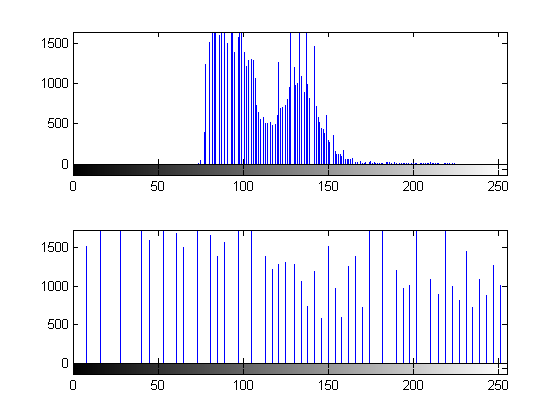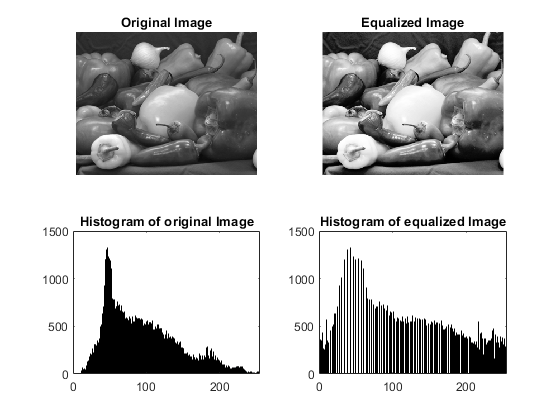Image Enhancement by Histogram Equalization
This example shows how to generate HDL code from a MATLAB® design that does image enhancement using histogram equalization.
Algorithm
The Histogram Equalization algorithm enhances the contrast of images by transforming the values in an intensity image so that the histogram of the output image is approximately flat.
I = imread('pout.tif');
J = histeq(I);
subplot(2,2,1);
imshow( I );
subplot(2,2,2);
imhist(I)
subplot(2,2,3);
imshow( J );
subplot(2,2,4);
imhist(J)

MATLAB Design
design_name = 'mlhdlc_heq'; testbench_name = 'mlhdlc_heq_tb';
Let us take a look at the MATLAB design
type(design_name);
%%%%%%%%%%%%%%%%%%%%%%%%%%%%%%%%%%%%%%%%%%%%%%%%%%%%%%%%%%%%%%%%%%%%%%%%%%%
% heq.m
% Histogram Equalization Algorithm
%%%%%%%%%%%%%%%%%%%%%%%%%%%%%%%%%%%%%%%%%%%%%%%%%%%%%%%%%%%%%%%%%%%%%%%%%%%
function [x_out, y_out, pixel_out] = ...
mlhdlc_heq(x_in, y_in, pixel_in, width, height)
% Copyright 2011-2015 The MathWorks, Inc.
persistent histogram
persistent transferFunc
persistent histInd
persistent cumSum
if isempty(histogram)
histogram = zeros(1, 2^14);
transferFunc = zeros(1, 2^14);
histInd = 0;
cumSum = 0;
end
% Figure out indexes based on where we are in the frame
if y_in < height && x_in < width % valid pixel data
histInd = pixel_in + 1;
elseif y_in == height && x_in == 0 % first column of height+1
histInd = 1;
elseif y_in >= height % vertical blanking period
histInd = min(histInd + 1, 2^14);
elseif y_in < height % horizontal blanking - do nothing
histInd = 1;
end
%Read histogram (must be outside conditional logic)
histValRead = histogram(histInd);
%Read transfer function (must be outside conditional logic)
transValRead = transferFunc(histInd);
%If valid part of frame add one to pixel bin and keep transfer func val
if y_in < height && x_in < width
histValWrite = histValRead + 1; %Add pixel to bin
transValWrite = transValRead; %Write back same value
cumSum = 0;
elseif y_in >= height %In blanking time index through all bins and reset to zero
histValWrite = 0;
transValWrite = cumSum + histValRead;
cumSum = transValWrite;
else
histValWrite = histValRead;
transValWrite = transValRead;
end
%Write histogram (must be outside conditional logic)
histogram(histInd) = histValWrite;
%Write transfer function (must be outside conditional logic)
transferFunc(histInd) = transValWrite;
pixel_out = transValRead;
x_out = x_in;
y_out = y_in;
type(testbench_name);
%Test bench for Histogram Equalization
% Copyright 2011-2018 The MathWorks, Inc.
testFile = 'mlhdlc_img_peppers.png';
imgOrig = imread(testFile);
[height, width] = size(imgOrig);
imgOut = zeros(height,width);
hBlank = 20;
% make sure we have enough vertical blanking to filter the histogram
vBlank = ceil(2^14/(width+hBlank));
for frame = 1:2
disp(['working on frame: ', num2str(frame)]);
for y_in = 0:height+vBlank-1
%disp(['frame: ', num2str(frame), ' of 2, row: ', num2str(y_in)]);
for x_in = 0:width+hBlank-1
if x_in < width && y_in < height
pixel_in = double(imgOrig(y_in+1, x_in+1));
else
pixel_in = 0;
end
[x_out, y_out, pixel_out] = ...
mlhdlc_heq(x_in, y_in, pixel_in, width, height);
if x_out < width && y_out < height
imgOut(y_out+1,x_out+1) = pixel_out;
end
end
end
% normalize image to 255
imgOut = round(255*imgOut/max(max(imgOut)));
figure(1)
subplot(2,2,1); imshow(imgOrig, [0,255]);
title('Original Image');
subplot(2,2,2); imshow(imgOut, [0,255]);
title('Equalized Image');
subplot(2,2,3); histogram(double(imgOrig(:)),2^14-1);
axis([0, 255, 0, 1500])
title('Histogram of original Image');
subplot(2,2,4); histogram(double(imgOut(:)),2^14-1);
axis([0, 255, 0, 1500])
title('Histogram of equalized Image');
end
Simulate the Design
It is always a good practice to simulate the design with the testbench prior to code generation to make sure there are no runtime errors.
mlhdlc_heq_tb
working on frame: 1 working on frame: 2

Create a New HDL Coder™ Project
coder -hdlcoder -new mlhdlc_heq_prj
Next, add the file 'mlhdlc_heq.m' to the project as the MATLAB Function and 'mlhdlc_heq_tb.m' as the MATLAB Test Bench.
Refer to Get Started with MATLAB to HDL Workflow for a more complete tutorial on creating and populating MATLAB HDL Coder projects.
Run Fixed-Point Conversion and HDL Code Generation
Launch HDL Advisor and right click on the 'Code Generation' step and choose the option 'Run to selected task' to run all the steps from the beginning through the HDL code generation.
Examine the generated HDL code by clicking on the hyperlinks in the Code Generation Log window.